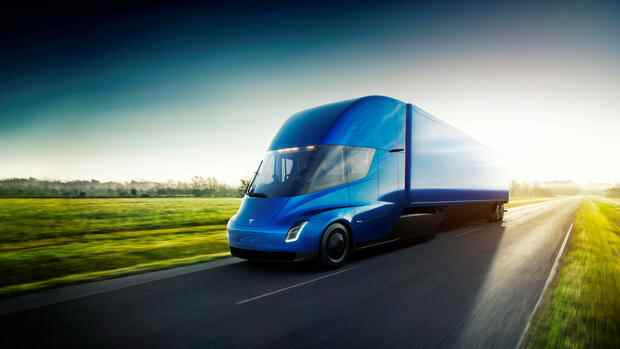Dusseldorf A long story seems to be coming to an end: “The Tesla Semi will be delivered this year with a range of 800 kilometers,” announced Tesla boss Elon Musk on Twitter on Wednesday. This is important news for numerous customers – and for the electric car manufacturer itself.
Tesla has already postponed the market launch of the electric semi-trailer several times – as with other models, such as the Cybertruck pick-up or the new model of the Roadster sports car. During the course of the day, the Tesla share reacted in a friendly stock market environment with a price jump of more than two percent.
Elon Musk already presented the Tesla Semi to the public in 2017 and at that time announced a market launch for 2019. After that there were delays: in the previous year, Tesla put a fleet of test vehicles on the road, but series production was not started due to a lack of battery capacity. The construction of the new factories in Germany and Texas also had priority.
That is changing now. Early customers include well-known companies such as the beverage manufacturer Pepsico, the logistics company Fedex, UPS and JB Hunt, as well as the retail giant Walmart. Customers make a down payment of $20,000 for a truck.
Top jobs of the day
Find the best jobs now and
be notified by email.
The basic version of the electric truck costs $150,000, while a comparable diesel truck is available in the US for $20,000 to $40,000 less. However, Tesla promises lower costs: electricity is cheaper than diesel, and there is no maintenance for the engine. Depending on the mileage, users could save the purchase price again within two years.
A long-haul solution?
However, the technology is controversial among experts. One thing is clear: Electric trucks make sense for shorter journeys. However, the technology could be less suitable for long-haul journeys, as it takes some time for the large batteries to be recharged. Tesla wants to solve the problem with its fast charging network – but it is still unclear how much the charging time will be reduced as a result.
Competitors such as Daimler Truck or Hyundai therefore rely on hydrogen and fuel cells and have presented their prototypes for heavy-duty trucks in the past few months and days. Fuel cells are lighter than batteries and therefore offer a longer range and shorter charging times. However, filling stations for hydrogen are still missing.
>> Read here: Rapid rise for Michael Lohscheller – ex-Opel boss will lead Nikola in future
It is also unclear how Tesla wants to make money with the electric trucks. According to the car manufacturer, the Tesla Semi needs five times as many battery cells as the car models. “But it doesn’t cost five times as much,” Musk said at an analyst conference in 2021.
This gives rise to two possibilities: Either Tesla has since reduced the manufacturing costs of battery cells so much that the Tesla Semi is worthwhile. Or the truck is initially a negative business.
More: “The diesel is becoming obsolete” – fleet managers swear by electric trucks
